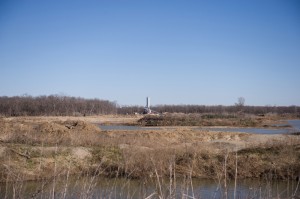Within the city’s borders, Fort Worth’s floodplain extends outward 300-500 feet along the Trinity, meandering from Lake Worth in the west to Randol Mill Road in the east before snaking through Dallas and eventually to the Gulf of Mexico.
The North Texas portion of the 710-mile-long Trinity has four branches or forks (the Clear, East, Elm, and West) that converge southeast of Dallas. And that translates into a lot of floodplain. Throughout the year, the lush area is a habitat and nesting ground for a diverse range of wildlife, including waterfowl and frogs.

But more and more since the 1980s and despite the high costs of flood insurance and the omnipresent danger of flooding, some of the floodplain is being used for homes, commercial spaces, and even surface mining operations, according to Clair Davis, who has been managing Fort Worth’s floodplain for the city since 2002, first as assistant floodplain administrator and then as the head administrator in 2008. From 2000 to 2009, his office saw a spike in applications for permits to build in Fort Worth’s floodplain, the most per year since 1980, when records were first kept. A large number of the requests, he said, came from oil and gas companies. The permit requests slowed during the recent nationwide recession and subsequent crash in gas prices but are on the rise again, though Davis said he doesn’t have enough information to offer an explanation.
Dong-Jun Seo, professor of civil engineering at the University of Texas at Arlington who has published more than 80 academic articles on the subject, has an explanation for nearby flooding.
The Trinity within North Texas “has been subject to increased flows and peaks due to urbanization,” he said.
“In a natural setting,” he continued, “the soil and vegetation tend to absorb more rainwater, and runoff into the Trinity tends to move more slowly. If you have paved surface and bare soil, you increase flow velocity, creating larger peaks and more runoff. That will have a negative impact as far as flooding.”
Valley storage, the dips and valleys that occur naturally on either side of a river’s banks, fill with overflowing water in the event of a flood, lessening the effects of fast-moving waters downstream.
Seo said the loss of valley storage to development can have “fairly large consequences downstream.”
But he said you can’t blame development alone for the Trinity’s behavior –– like the rest of the world, North Texas is experiencing the effects of climate change.
“We need to see longer-term data to be able to make statistical inferences,” he said.
David Marshall, director of engineering at the Tarrant Regional Water District, the governmental group managing drinking water and flood control measures for Fort Worth since 1924, echoed Seo’s explanation, adding that increased runoff from streets and roads also exacerbates flooding all along the Trinity.
Bell Helicopter, a 55-acre campus with 3,000 employees which opened in 1955, has long been credited for spurring growth in the area surrounding Amendola’s ranch. The plant sits only one mile north of her place.
As part of the growth, Ken Byron Newell, nephew of legendary golfer Byron Nelson, has been providing housing and business spaces for the sparsely but expanding area just north of Amendola’s ranch for decades. Newell Companies, the parent company for several subsidiary companies owned by Newell, focuses its projects on the East Side of Fort Worth.
On or near the Trinity’s floodplain are two of Newell’s early projects: RiverBend Estates, a 210-unit residential complex bordered to the north by West Fork Trinity River, to the east by Handley Ederville Road, and to the west by Woodhaven Boulevard; and RiverBend Industrial Park, a 12,000-acre commercial development with office spaces and warehouses just west of East Loop 820 and south of Highway 121. Construction of both projects, according to city documents and published reports, began in the early 1980s and was completed in the early 1990s.
In 2003, Newell Companies developed land for a separate company unaffiliated with Newell, Trussway Limited, a company that builds trusses and other building components.
And in 1999, he started work on Trinity Lakes, a 1,600-acre residential and mixed-use project just north of the Trinity and west of Precinct Line Road. More than 1,400 single-family homes are located within the development –– and counting. Construction is ongoing.
Though Amendola may blame all of this and other developments for her woes, the 69-year-old native Fort Worthian developer has a big supporter in Wanda Conlin, president of East Fort Worth Business Association, a 42-year-old development advocacy group. Conlin, who’s been living in the nearby Meadowbrook neighborhood for 50-plus years, believes Trinity Lakes could have a “big impact” on the East Side, chiefly because the development calls for retail in addition to housing.
“We do not have a lot of entertainment, restaurants, or outlet stores in the area,” she said. Newell’s projects “could really make a difference.”
Newell became a developer by virtue of his father, Jack Newell, who started Newell & Newell in 1954. The development company built RiverBend Business Park, a 2 million-square-foot industrial and business park, in the mid 1970s.
Newell has another fan in Jacqui Nesbitt, president of the Lakes of River Trails East HOA, representing 141 homes in Trinity Lakes, for the past three years as well as a resident of the neighborhood she represents since 2011. Among the many events that she regularly helps organize are movies in the park, 4th of July cookouts, a Halloween party, and springtime meet and greets for new residents.
“We love living here,” she said. “It’s a nice neighborhood. My son and his family live here also. The area we live in has a beautiful lake and a wooded area around a part of the lake.”
She also enjoys working closely with Newell, whom she describes as a “nice gentleman who is always very friendly and outgoing.”
Newell’s businesses also are attracting other kinds of attention. Regulatory agencies have fined or chastised some of his businesses recently for work that several of them have undertaken around Amendola’s farm.
A recent fine involved Metroplex Sand & Gravel, his 27-year-old business that provides highway construction companies with gravel and sand on a contract basis. Coming from the Texas Commission on Environmental Quality, the fine, said TCEQ spokesperson Andrea Morrow, was for $5,000 for a lack of proper registration as a mining operation. Metroplex Sand & Gravel paid $2,000, $1,000 was “deferred” or forgiven, and $2,000 was offset by a donation to Texas Association of Resource Conservation and Development Areas, a network of volunteer councils whose members advise businesses and individuals on natural resource conservation.
And in late 2014, floodplain manager Davis said that his department ordered Newell to lower an elevated road near Bell Helicopter. Newell complied in February 2015, Davis said.
In a phone interview a couple of months ago, Newell chalked it all up to crossed lines.
“There was a bit of miscommunication between our engineer and the city,” he said. “Our engineer felt he had communicated everything, and the city understood what was going on. Things fall in between the cracks sometimes, and communication doesn’t always get through. As soon as we understood their position, we corrected it.”
Newell said he is playing by the rules. The fines and chastisements are the results of procedural “misunderstandings,” he said.
Still, one of Newell’s developments is currently under investigation by the U.S. Army Corps of Engineers, according to Corps spokesperson Clay Church, for “potential violations of … the Clean Water Act,” a federal law passed in 1972 that regulates pollutant discharges into U.S. waters.
The development involves ongoing construction on a 75-acre tract of protected wetlands near Amendola’s ranch.
“Depending on the type or level of the violation,” said Church, “our investigations may involve the Environmental Protection Agency,” the federal regulatory group.
The Corps issued a cease-and-desist order against Newell last February but did not specify which company or project was at fault.
Church said the case is currently classified as an “open file,” meaning it has not been resolved yet. He added he is unable to “discuss past that.”
******












The impact of the flooding at Trinity River Farm cannot be understated. My son, 10, has Autism, and has been taking riding lessons at Trinity River Farm for a year. He has changed dramatically, and developed a confidence I’ve never seen in him before. Miss Julie’s farm has been a major factor in his recent growth and development. The programs she runs benefit so many people in this community, and we would be devastated if it were to happen again, or something were to happen to the horse we are leasing from Miss Julie.
If Mr. Newell would like to make a positive impact on the community, he could consider sponsoring some of the local school children living in the apartments on Randol Mill to take riding lessons. He would be giving them the opportunity to be outdoors and develop equestrian skills. …Or he could stop building up the land directly north of the farm, thus pushing the water south of the river, impacting not only Miss Julie’s farm, but my community in Bentley Village.